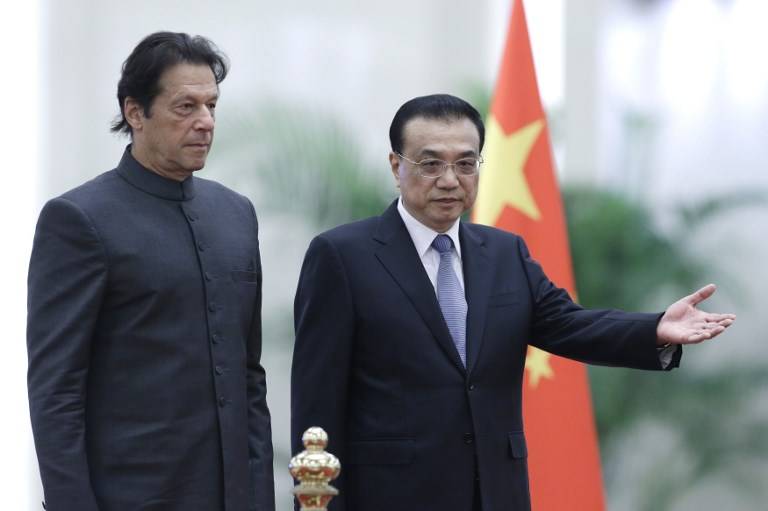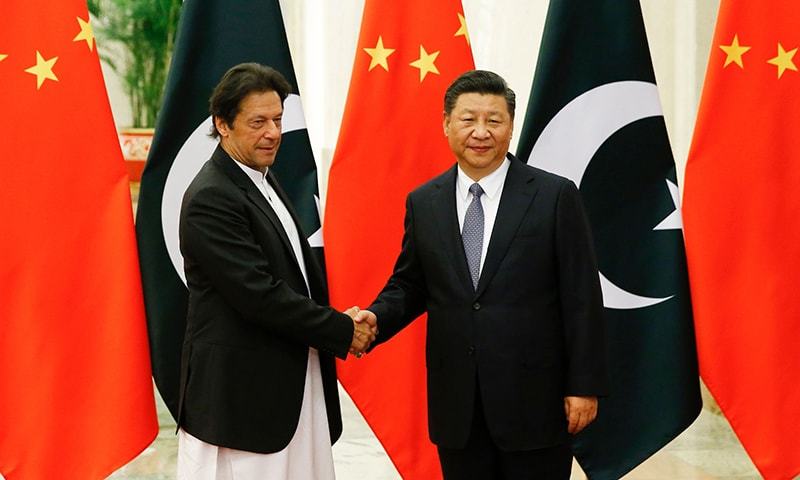
Prime Minister Imran Khan is currently on his first official visit to China after taking oath as Pakistan's Prime Minister in August. The high profile visit was partially overshadowed by the Tehreek-e-Labbayk Pakistan protests across the country over the acquittal of Aasia Bibi from the Supreme Court in a blasphemy case.
The big news from Beijing is that Chinese government has promised to 'provide necessary assistance to Pakistan ... but more talks are needed'. At the same time, Chinese Vice Foreign Minister told the media after PM's meeting with his Chinese counterpart that there were no plans to 'scale back the CPEC'.
According to sources within Chinese media, the Chinese officials might have raised the statements issued by cabinet members about the issues with China-Pakistan Economic Corridor (CPEC).
In the official communique issued to the media after Chinese Foreign Minister Wang Yi's meeting with his Pakistani counterpart Shah Mehmood Qureshi, Yi especially mentioned that the officials on both sides should be careful about matters of significance, as reported by Chinese media.

South China Morning Post also reported that Beijing also took a firm line on the various infrastructure agreements between the two sides under the China-Pakistan Economic Corridor (CPEC) – part of the wider “Belt and Road Initiative”.
However, the Chinese ambassador has denied the reports of Imran Khan being shown any such evidence, saying in a tweet that China is known for its hospitality.
It is pertinent to mention that Pakistani cabinet members have repeatedly voiced their concerns about the contracts awarded to Chinese companies in the past. PM's adviser on Commerce and Industries Abdul Razzak Dawood had stated in an interview with Financial Times that ‘the previous government had done a bad job at negotiating with China on CPEC’. He went on to add that Chinese companies were getting all the tax breaks while Pakistan companies were disadvantaged. “I think we should put everything on hold for a year so we can get our act together,” he added. “Perhaps we can stretch CPEC out over another five years or so.”
CPEC is worth 62 billion dollars. It is China's biggest investment in any country and is considered pivotal to its Belt and Road Initiative. Pakistani officials' statements about some of the projects under CPEC have previously drawn attention of the Chinese officials.
However, PM's visit is expected to bridge the communication gap and with the assistance of a seasoned diplomat and politician Shah Mehmood Qureshi as his foreign minister, PM Imran Khan should certainly be able to address the concerns of the Chinese authorities regarding the future of CPEC.
This article was updated at 8pm on Nov 5, 2018.
The big news from Beijing is that Chinese government has promised to 'provide necessary assistance to Pakistan ... but more talks are needed'. At the same time, Chinese Vice Foreign Minister told the media after PM's meeting with his Chinese counterpart that there were no plans to 'scale back the CPEC'.
According to sources within Chinese media, the Chinese officials might have raised the statements issued by cabinet members about the issues with China-Pakistan Economic Corridor (CPEC).
In the official communique issued to the media after Chinese Foreign Minister Wang Yi's meeting with his Pakistani counterpart Shah Mehmood Qureshi, Yi especially mentioned that the officials on both sides should be careful about matters of significance, as reported by Chinese media.

South China Morning Post also reported that Beijing also took a firm line on the various infrastructure agreements between the two sides under the China-Pakistan Economic Corridor (CPEC) – part of the wider “Belt and Road Initiative”.
However, the Chinese ambassador has denied the reports of Imran Khan being shown any such evidence, saying in a tweet that China is known for its hospitality.
It is pertinent to mention that Pakistani cabinet members have repeatedly voiced their concerns about the contracts awarded to Chinese companies in the past. PM's adviser on Commerce and Industries Abdul Razzak Dawood had stated in an interview with Financial Times that ‘the previous government had done a bad job at negotiating with China on CPEC’. He went on to add that Chinese companies were getting all the tax breaks while Pakistan companies were disadvantaged. “I think we should put everything on hold for a year so we can get our act together,” he added. “Perhaps we can stretch CPEC out over another five years or so.”
CPEC is worth 62 billion dollars. It is China's biggest investment in any country and is considered pivotal to its Belt and Road Initiative. Pakistani officials' statements about some of the projects under CPEC have previously drawn attention of the Chinese officials.
However, PM's visit is expected to bridge the communication gap and with the assistance of a seasoned diplomat and politician Shah Mehmood Qureshi as his foreign minister, PM Imran Khan should certainly be able to address the concerns of the Chinese authorities regarding the future of CPEC.
This article was updated at 8pm on Nov 5, 2018.
